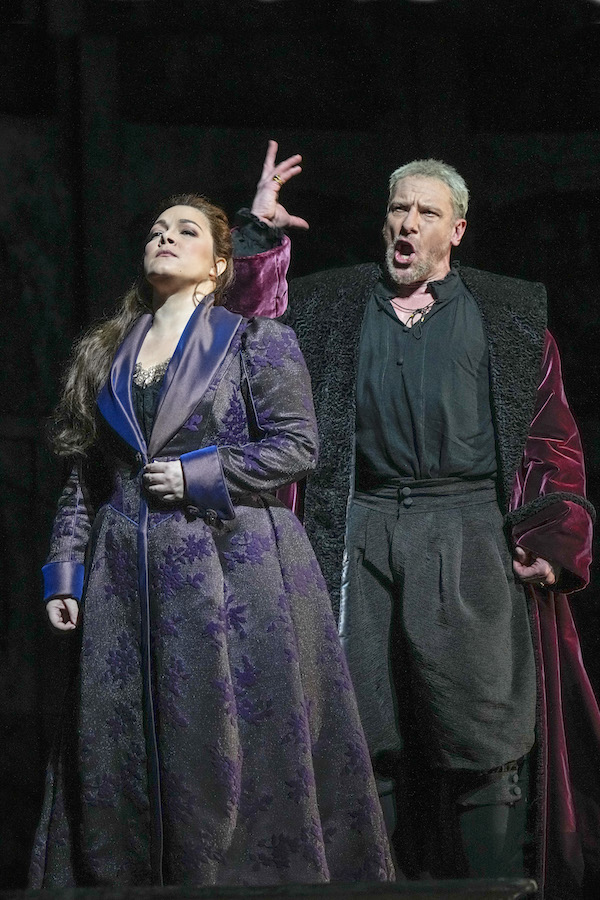“Don Carlo” returns to Met with vocal power, exceptional cast

Verdi’s Don Carlo returned to the Metropolitan Opera in David McVicar’s imposing production from last season. Created for the Met premiere of the original five-act French version of the opera, the present staging returns in the more common performed four-act Italian-language incarnation.
The Met has assembled an exciting cast for this run anchored by the towering King Philip II of Günther Groissböck.
Set against the backdrop of the Spanish Inquisition, the opera is a story of political intrigue and dynastic conflict. At its core, however, Don Carlo is a love story, which ends in death or misery for all.
Don Carlo has returned to Spain to find that his beloved Elizabeth of Valois has married his father King Phillip. The growing realization that his wife never loved him, which coupled with his son’s insistence that the people of Flanders be liberated from the horrors of the Inquisition, poisons the king’s mind.
King Phillip’s power is illusionary, however, as he is subject to the dictates of the Grand Inquisitor, not his heart. As the opera ends, with his son dead, Phillip is overcome with remorse as the voice of the ghost of Charles V is heard proclaiming that suffering is unavoidable and relief afforded only in heaven.
McVicar created what amounts to a unit set of large stone structures with alcoves—a starkness that is most effective in the tomb and prison scenes. The staging does have its incongruities with the libretto, however, such as a lush garden devoid of any vegetation whatsoever. True visual excitement is furnished by elaborate period costumes and the crowns which sit upon the heads of the king and queen.
McVicar’s bold strokes include the giant thurible wafting incense hanging over the tomb of Charles V and the massive crucified Christ that dominates King Phillip’s private chamber. The latter image particularly resonates as the Grand Inquisitor demands that Phillip sacrifice his son for the people of Spain, just as God did with his own son for the sake of humanity.
The brilliant robes of clergy and nobles are in stark contrast to the the victims of the Inquisition being dragged across the stage in the auto-de-fe scene. A jester tumbles across the stage mocking the suffering of the condemned, whose antics are as incongruous as they are annoying. The chorus observes the spectacle from gilded alcoves. It concludes with the walls opening to allow king and queen to exit into a blaze of gold and light, while the heretics are tortured to death.
Russell Thomas, who made his Met debut in 2005 as the Herald in Don Carlo, returned to its stage in the title role. There’s no arguing about the beauty of Thomas’ voice and the ease with which it soars through the relatively high tessitura of the role. The heat in his Don Carlo has to blaze brighter, however, to command the Met stage, especially with this high-powered cast.
Eleanora Buratto was making her role debut as Elizabeth, replacing the originally scheduled Anna Netrebko. Buratto was a dignified Elizabeth, able to control her actions, if not her affections. This poise was mirrored in Buratto’s singing, notable for the creamy beauty of her voice and the breadth and sensitivity of her phrasing. Elizabeth’s grand outpouring of despair in the aria “Tu che le” found her singing with fiery intensity and full-voiced passion.
Peter Mattei’s voice may lack the thrust and cut normally associated with a Verdi baritone, but its beauty and his compelling characterization made for a fascinating, exceptionally nuanced Rodrigo. Mattei also has power to spare as evidenced in his Act II confrontation with Don Carlo, when his voice shot out like a thunderbolt.
Yulia Matochkina was a visually alluring and vocally exciting Princess Eboli. The Russian mezzo-soprano, who made her Met debut in 2022 as Maddalena in Rigoletto, has a powerhouse of a voice. Its beauty was revealed in her enticing and provocative Veil Song, while the intensity which she brought to “O don fatale’, made the aria the showstopper it should be.
The vocal and dramatic duels between John Relyea’s terrifying Grand Inquisitor and Groissböck’s King Phillip were gripping, as well as emotionally devastating. Any goodwill or inclinations towards clemency that Phillip harbored in his heart towards anyone were suppressed by the Grand Inquisitor’s relentless demands that God’s will be done no matter what the price.
And Groissböck’s King Phillip did not yield to such pressure willingly. The Austrian bass demands attention. Virile and athletic, he cuts a dashing, dangerous figure as King Phillip, but it is the power and penetration that he brings to his singing that makes him so exceptional on stage in any role.
Carlo Rizzi brought out all the beauty and excitement in Verdi’s score with the Met chorus and orchestra performing at their inestimable best. Still, there were instances when Rizzi let the orchestral all but overwhelm the singers. They came as a surprise as the conductor was so adroit elsewhere at reducing the orchestra’s sound to a mere shimmer of sound to let the singers all but whisper their innermost thoughts.
This season the Met has assembled exceptional casts in some of the greatest and most popular works in the operatic canon. This Don Carlo is no exception.
Don Carlo runs through December 3 with Angela Meade taking over the role of Elizabeth of Valois on November 23. metopera.org